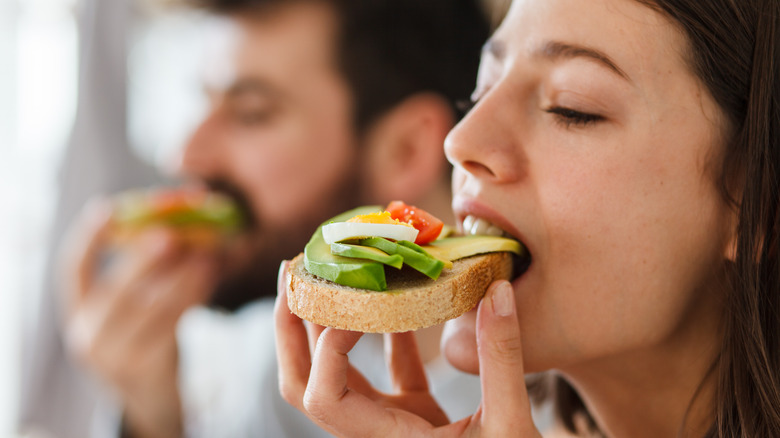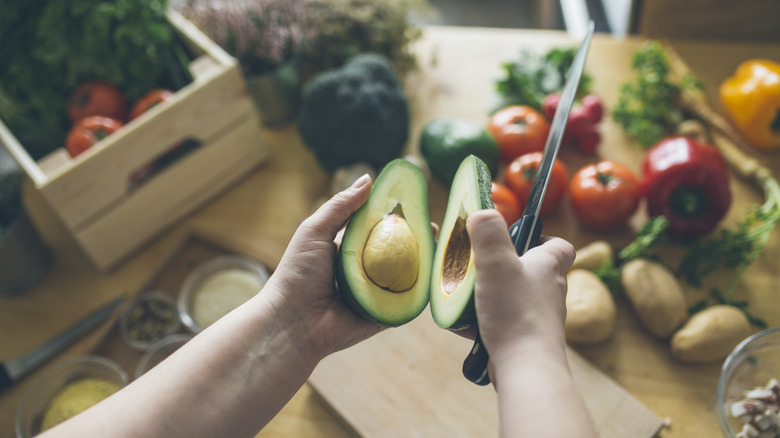Avoid Eating Avocados If You Have This Medical Condition
Avocados — those dark green to black-hued, egg-shaped fruits native to Mexico south to the regions of the Andes — are notorious for ripening when you turn away from them for a second. Yet, they are packed full of nutrients, like healthy fats, protein, fiber, potassium, magnesium, and vitamins C, E, K, and B6.
They're great for heart health, protect your eyes from UV damage, improve bone health, aid digestion, and protect against chronic diseases (per Medical News Today). If you have one medical condition, however — kidney disease — this fruit usually gets a bad rap, mainly owing to its high potassium content (half a fruit has as much as 345 milligrams).
Those with kidney disease are usually asked to limit or avoid sodium, potassium, and phosphorus in their diet, mainly because their kidneys aren't working as they should and this can result in a higher-than-normal level of each of these minerals, per Cleveland Clinic. Your kidneys perform the all-important function of maintaining a healthy level of potassium in your system by filtering out what it doesn't need and removing it as waste through your urine. With kidney disease, this function becomes impaired. If you eat avocado every day with this medical condition, you might be putting yourself at risk of hyperkalemia (high potassium levels) which will manifest in physiological symptoms like muscle weakness, tingling, numbness, nausea and vomiting, and irregular heartbeat (per National Kidney Foundation). Does this mean you have to swear off avocados at all costs? Well, that depends.
Some people with kidney disease may be able to eat avocados
Not everyone with the medical condition has to completely avoid avocados, according to registered dietician nutritionist Kellsey Reed (via Patients Like Me). "Avocados are packed with fiber, healthy fats, and potassium. Fiber and healthy fats are great additions to a kidney-friendly diet because they help to manage your blood sugars, blood pressure, cholesterol levels, and gut health," shared the expert.
However, if you have kidney disease and you're on a potassium-restrictive diet, you have to be mindful. This might be true for someone with later-stage kidney disease, for example.
There is no one-size-fits-all approach to chronic kidney disease, according to Reed. Although avocados generally fall under the group of foods you're asked to avoid, you can still enjoy the rich and creamy fruit in your diet if your potassium levels are normal or low, depending on what your doctor recommends. Here's how you can do that.
Consuming avocados with kidney disease
As explained by registered dietitian and renal nutrition expert Jessianna Saville (via The Kidney Nutrition Institute), the key is to work with your healthcare provider and know where you fall in your blood potassium level range and then decide how best to include avocados into your diet. The dietician illustrated that having a whole tomato is different from putting a slice of tomato on your toast and the same principle applies to consuming avocado.
So, adding a sliver of avocado to your toast in the morning or sticking with just a quarter of the fruit in a salad might be okay. The key here is to avoid eating too much avocado.
According to Saville, even if you're on a potassium-restrictive diet (which usually means you're limiting your potassium intake to under 2,000 milligrams a day), you may have some wiggle room to include avocados as long as you're keeping to your recommended daily intake of this mineral. However, keep in mind that almost all foods have potassium in them, so if your doctor has specifically told you to be mindful of potassium intake with your medical condition, you're better off avoiding avocados altogether. The best course of action is to run your dietary choices or changes by your renal nutrition specialist. They'll be able to best help with your particular stage of the medical condition and how to handle your potassium levels with what you consume.



